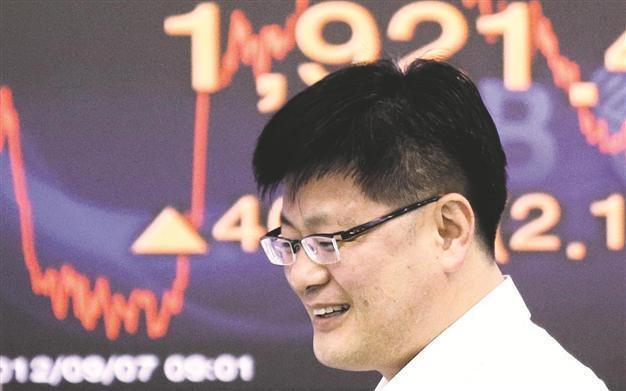Markets take off after European Central Bank’s bond scheme
LONDON / PARIS

A currency trader smiles near a screen showing the Korea Composite Stock Price Index (KOSPI) in Seoul, Sept. 7. Asian markets, following U.S. bourses rose after the ECB’s decision to buy the bonds of the debt-ridden eurozone countries. AFP photo
Stock markets in Europe and Asia gained on Sept. 7, and yields on the debt of struggling euro zone nations fell as investors welcomed the European Central Bank’s latest bond-buying plan .
The markets’ main driver has been the ECB’s new and potentially unlimited bond buying plan, which is hoped will lower the borrowing costs facing indebted nations like Spain and Italy and ease fears over the future of the single currency. The broad FTSEurofirst 300 index of top European companies was up 0.3 percent at 1,107.73 points in early trade after climbing 2.6 percent on Sept. 6 when the plan was announced.
In initial deals, London’s benchmark FTSE 100 index climbed 0.17 percent to 5,787.36 points, Frankfurt’s DAX 30 rose 0.23 percent to 7,183.92 points and in Paris the CAC 40 gained 0.25 percent to stand at 3,518.72 on Sept. 7. “I am positive on the market in the near term. You have got the policy response coming through, valuations are still OK, and the macroeconomic backdrop isn’t all that bad. These three things add to the momentum in the market,” said Graham Bishop, equity strategist at Exane BNP Paribas.
Markets rally around worldReaction to the ECB programme had earlier sent U.S. stocks to multi-year highs and put Asian shares on track for their biggest daily gain in six weeks on Sept. 7.
The gains have lifted the MSCI’s world equity index back to levels last seen in early May after a rise of about 2.4 percent over the past 24 hours.
Tokyo stocks jumped 2.20 percent Sept. 7, in line with a regional rally following gains on Wall Street and in Europe. The Nikkei 225 index at the Tokyo Stock Exchange closed at 8,871.65, up 191.08 points, while the broader Topix index of all first-section shares gained 2.25 percent, or 16.17 points, to 735.17, and South Korea’s KOSPI up 2.2 percent.
France to shave 10 bln eurosFrench President Francois Hollande insisted Sept.7 that France will meet its target of slashing public deficit to three percent of output by 2013, as he eyes savings worth 10 billion euros in 2013.
“I confirm here the engagement undertaken for France to bring down its public deficit to 3 percent by the end of 2013. It would be the most significant budgetary effort in 30 years,” he told the Court of Auditors.
He stressed that it was necessary to meet the target in order to “preserve the quality of the French signature with regards to the markets to finance our debt at the lowest possible interest rates, which is the case today.” He acknowledged that the economic slowdown would make it harder to meet the objective, which is also the often flouted EU ceiling.
This means “a little more than 33 billion euros ($41.7 billion) in terms of inflection of spending and in terms of additional receipts,” he said promising that the effort will be “shared out fairly”.
“That’s the reason why I refuse, with my government, a general and undifferentiated rise in taxes for households, which hurts their purchasing power,” he said.
“Those who have more should pay more.” He also noted that the tax burden would be shared between small and medium sized businesses and multinationals in a “manner to better levy them without hurting competivity.” Rather he is hoping to make billions in savings by 2013 through spending cuts.
Germany’s central bank opposes the ECB’s plan to lower the borrowing costs of euro zone states like Spain and Italy by buying their bonds. For the country’s conservative newspapers, many of which have taken an increasingly euro-sceptic stance as the three-year-old euro zone debt crisis wears on, Draghi’s latest measures went too far.
“Help without end for crisis countries,” said Bild on its front cover, adding that Draghi had signed a “blank cheque” and that his policy endangered the independence of the ECB. “Draghi sets off Germany’s alarm bell,” was the headline in the conservative daily Die Welt.
Business daily Handelsblatt had a cover story on “the Rise, Fall and Resurrection of the Bundesbank” and gave prominence to Weidmann’s warnings.
